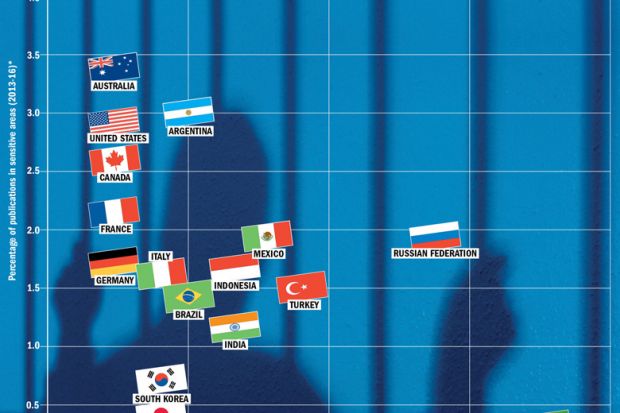View a high-resolution version
Repressive countries produce far less research on politically sensitive topics than more open societies, according to analysis by Times Higher Education that shows the influence of politics on academic priorities.
In 2013-16, just one in 500 publications from researchers in China was on topics such as history or political science, compared with nearly one in 20 in the UK.
A statistical analysis using Elsevier’s Scopus research database showed a moderate correlation between G20 countries’ political rights and civil liberties – measured by the US-based thinktank Freedom House – and their creation of potentially contentious research.
It shows that despite huge growth in China’s research output, proportionally very little of this has come in the three subject areas analysed: history, political science and international relations, and sociology and political science.
In 2013-16, China produced about 1.5 million research publications, second only to the US and more than double third-placed UK. But in these sensitive subjects, it is at best middle ranked, and in history produced just 436 papers, fewer than Argentina.
Kerry Brown, former first secretary of the British embassy in Beijing and a professor of Chinese studies at King’s College London, commented that the Chinese education system “privileges and prioritises science and economic study”.
“For talented young Chinese researchers, it is a simple calculation: go into an area where there is less political sensitivity and more funding support, or one where there is more potential problems and less money,” he said.
He added that there were “plenty” of Chinese academics working on social and political sciences, but “they tend to concentrate on highly granular work about China”.
This work was “often circumscribed” by the “idea that China is exceptional, a world within itself, and that China does not contribute hugely to global generic discourse on political and social science issues”.
Since President Xi Jinping came to power in 2012, the political climate in China has arguably become more repressive and "Western" ideas in universities have come under attack.
Last month, The Guardian reported that an increasing number of academics were fleeing China for the US because of the worsening situation.
Aside from politics, China’s aversion to sensitive subjects may also be due to an apparent lack of focus on the disciplines in East Asia. Despite having high scores for freedom, just 0.4 per cent of publications were on these subjects in Japan, and 0.7 per cent in South Korea.
Russia was an outlier to the overall trend. Despite a poor freedom score, it produced proportionally more papers in contentious areas than Germany or Italy.
Although it produced few papers, China’s history and political science papers did appear to be of higher quality than the national average, at least in terms of field-weighed citations.
POSTSCRIPT:
Print headline: Sensitive subjects?: political climate and controversial research
Register to continue
Why register?
- Registration is free and only takes a moment
- Once registered, you can read 3 articles a month
- Sign up for our newsletter
Subscribe
Or subscribe for unlimited access to:
- Unlimited access to news, views, insights & reviews
- Digital editions
- Digital access to THE’s university and college rankings analysis
Already registered or a current subscriber?




